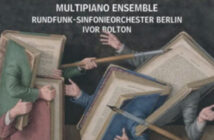This page is also available in / Cette page est également disponible en:
![]() Francais (French)
Francais (French)
-
PIAS4
I dithered for weeks over whether or not to review this release, for reasons that will soon become clear. In the course of my indecision I listened to it at least ten times, so much so that it became a signifier of the state of our world in the war-torn, climate-seared summer of 2022. It is now a candidate for record of the year.
 Matangi are a Dutch string quartet, enterprising in its choice of unheard and little-heard music. The album consists of works by Alfred Schnittke, Valentin Silvestrov and Dmitri Shostakovich, none of whom can be considered obscure or, as the title proclaims, rejected. All, despite their private degrees of dissension, survived and generally thrived in the Soviet Union.
Matangi are a Dutch string quartet, enterprising in its choice of unheard and little-heard music. The album consists of works by Alfred Schnittke, Valentin Silvestrov and Dmitri Shostakovich, none of whom can be considered obscure or, as the title proclaims, rejected. All, despite their private degrees of dissension, survived and generally thrived in the Soviet Union.
The three works performed are Schnittke’s 3rd quartet of 1983, Shostakovich’s 8th of 1969 and Silverstrov’s first of 1974. The first two received more penetrating recordings by, for instance, Kronos and the Borodin Quartet. What makes this recording stand out, however, is their positioning before and after the introspective, deceptively ingratiating quartet by the leading Ukrainian composer Silvestrov, a man whose moral integrity shines through the murk of the disintegrating empire he inhabited.
Silvestrov, now a refugee in Germany, writes music of rage and consolation, the emotions interacting therapeutically in undemonstrative textures. Matangi make a masterpiece out of this beautifully understated quartet. More: by placing it between Schnittke and Shostakovich they create a sound world that belongs both to the time of its creation and, insistently, to the present moment.
Their Schnittke may lack the acrid edge of the composer’s biting irony and their Shostakovich is a tad too smooth for my understanding of the work. But these are minor quibbles. This album is so much more than the sum of its parts. It is modern history in motion.
NL
This page is also available in / Cette page est également disponible en:
![]() Francais (French)
Francais (French)













1 Comment
Pingback: A classical record that is modern history in motion | TraxBeater